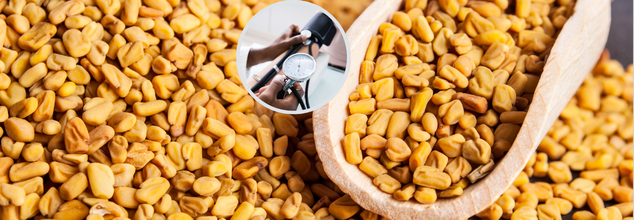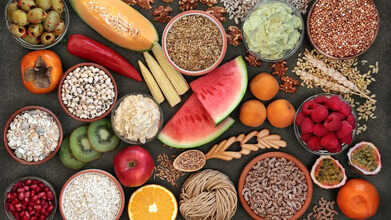- Health Conditions A-Z
- Health & Wellness
- Nutrition
- Fitness
- Health News
- Ayurveda
- Videos
- Medicine A-Z
- Parenting
- Web Stories
How Fenugreek Seeds Can Help Manage High Blood Pressure

How Fenugreek Seeds Can Help Manage High Blood Pressure
High blood pressure tends to a major concern during winter season due to colder temperatures causing blood vessels to constrict, increasing resistance and pressure. Reduced physical activity, stress, and high-sodium comfort foods contribute further. Managing winter hypertension involves regular exercise, a heart-healthy diet, stress control, and monitoring blood pressure to prevent complications.
In the pursuit of healthier lifestyles, functional foods—those with proven health benefits—have garnered significant attention. Fenugreek seeds, a staple in South Asian cuisine and traditional medicine, are emerging as a powerhouse for managing chronic conditions such as high blood pressure. This article delves into the science-backed health benefits of fenugreek seeds and their potential role in regulating blood pressure effectively.
What Are Fenugreek Seeds?
Fenugreek (Trigonella foenum-graecum) is a plant native to the Mediterranean region, Western Asia, and Southern Europe. Its seeds, known for their slightly sweet and nutty flavor, are widely used in culinary and medicinal applications. Beyond the kitchen, fenugreek seeds have been utilized for centuries in alternative medicine to treat various ailments, including inflammation, digestive issues, and skin conditions.
Packed with essential nutrients, fenugreek seeds have a complex nutritional profile. A 100-gram serving contains approximately:
- 60% carbohydrates
- 25% dietary fiber
- 23 grams of protein
- 6 grams of lipids
The seeds are also rich in potassium, magnesium, phosphorus, and calcium—minerals essential for heart health and blood pressure regulation.
How Fenugreek Affects Blood Pressure
Fenugreek’s unique composition makes it a promising candidate for managing high blood pressure (hypertension). Here’s how:
1. Rich in Potassium
Potassium is a key mineral that helps counteract the effects of sodium, a common contributor to high blood pressure. Fenugreek’s high potassium content helps maintain a healthy balance, reducing strain on blood vessels.
2. High Dietary Fiber
Fenugreek seeds are abundant in soluble fiber, which helps improve heart health by reducing cholesterol levels. Lower cholesterol levels are directly linked to better blood pressure control, as clogged arteries force the heart to pump harder.
3. Antioxidant and Anti-Inflammatory Properties
Fenugreek seeds contain compounds such as flavonoids, saponins, and trigonelline, which have potent antioxidant and anti-inflammatory effects. These properties protect blood vessels from oxidative damage and inflammation, both of which are contributors to hypertension.
4. Improved Insulin Sensitivity
Fenugreek seeds enhance insulin sensitivity and glucose metabolism. Poor insulin function is linked to increased blood pressure, and by improving this pathway, fenugreek helps reduce hypertension risk.
5. Natural Diuretic Effect
Fenugreek’s diuretic properties promote the elimination of excess sodium and water from the body, relieving pressure on blood vessels and aiding in blood pressure regulation.
A study published in the Journal of Food Science highlights the bioactive compounds in fenugreek seeds, particularly 4-hydroxyisoleucine (4-HIL) and saponins, as key contributors to its health benefits. These compounds help improve vascular function, reduce oxidative stress, and enhance metabolic health. Moreover, fenugreek’s ability to reduce low-density lipoprotein (LDL) cholesterol further underscores its cardiovascular benefits.
Adding Fenugreek Seeds into Your Diet
Fenugreek seeds are versatile and can be easily incorporated into various dishes to harness their health benefits. Here are some ideas:
- Tea: Soak fenugreek seeds overnight and boil them in water the next morning to create a refreshing and health-boosting tea.
- Soups and Curries: Add ground fenugreek seeds to soups and curries for a subtle flavor and added nutritional boost.
- Sprouted Seeds: Sprout fenugreek seeds and add them to salads or sandwiches for a crunchy, nutrient-dense addition.
- Baked Goods: Incorporate fenugreek seed powder into bread, muffins, or pancakes for a functional twist.
For those looking for a convenient option, fenugreek seed supplements and powders are readily available in health stores. However, it is essential to consult a healthcare professional before starting any supplement regimen, particularly for individuals on medication for blood pressure or diabetes.
Precautions and Side Effects
While fenugreek is generally safe for most people, it may cause minor side effects such as nausea, dizziness, or abdominal discomfort in some cases. Individuals with diabetes should be cautious, as fenugreek may lower blood sugar levels, increasing the risk of hypoglycemia when combined with diabetes medication. Additionally, it may interact with anticoagulants and affect the absorption of oral drugs.
Fenugreek seeds offer a natural, science-backed way to manage high blood pressure and promote overall heart health. Their nutrient-dense composition, coupled with their ability to regulate cholesterol, improve vascular function, and reduce inflammation, makes them a valuable addition to any diet aimed at preventing or managing hypertension.
The Effects of Fenugreek Seed Consumption on Blood Pressure. 2023. Italian Society of Hypertension.
Current perspectives on fenugreek bioactive compounds and their potential impact on human health. Journal of Food Science. 2024
Is The Viral Wellness Trend ‘Fibremaxxing’ Helping Or Harming Your Gut?

Credits: CANVA
Tiktok fibremaxxing wellness trend: There is no shortage of wellness trends online that claim to transform your health, but a new one has taken over social media with a focus on gut health. It’s called “fibremaxxing,” and its premise is simple: eat more fibre to improve digestion, metabolism, immunity, and lower the risk of disease. On TikTok and Instagram, the trend often appears as colourful lentil bowls, chia puddings, and smoothies loaded with leafy greens and flaxseeds. But how much of this viral trend is actually backed by science?
The idea of increasing both soluble and insoluble fibre isn’t new, yet fibremaxxing has made it trendy again—and this time, for good reason. Fibre is vital to everyday health, supporting everything from steady blood sugar to regular bowel movements. Here’s what experts say about this growing movement and why fibre truly matters.
What Is Fibremaxxing?
Fibremaxxing is a social media movement that encourages people to boost their fibre intake by adding more fruits, vegetables, legumes, and whole grains to every meal. The goal is to improve digestion, promote fullness, and support long-term health. According to Dr. Urvi Shah, a board-certified hematologist-oncologist and physician at Memorial Sloan Kettering Cancer Center, the concept behind fibremaxxing is largely rooted in scientific evidence. Dr. Shah, who is leading multiple studies on high-fibre plant-based diets, notes that the approach aligns well with established nutrition research.
Is ‘Fibremaxxing’ Good Or Bad For Your Gut?
High-fibre diets are consistently linked to a wide range of health benefits, from lowering the risk of heart disease, diabetes, and colon cancer to aiding weight control and gut function. That’s why Dr. Shah believes fibremaxxing gets several aspects right.
She explains that including a wide variety of plant-based, high-fibre foods is essential because “different fibre types feed different microbes.” A diverse diet helps nurture a balanced microbiome. She adds that the trend’s emphasis on whole foods rather than processed or fibre-enriched items is a major plus. “Whole plants provide fibre, polyphenols, and micronutrients that work together to support the gut,” she says. Prebiotic-rich foods also help shape a healthier microbiota and increase the production of beneficial short-chain fatty acids like butyrate, which has “anti-inflammatory and anti-cancer effects.”
Simply put, upping your fibre intake through natural, unprocessed foods, rather than supplements, can make a real difference to gut health.
What’s The Daily Recommended Amount of Fibre Intake?
Experts suggest that adults should consume between 25 and 30 grams of fibre each day. Men typically require more (around 38 grams), while women need about 25 grams. These numbers can vary depending on age, sex, and calorie intake, but a general guideline is 14 grams of fibre for every 1,000 calories eaten, according to Harvard Health.
How To Add Fibre To Your Diet?
Plant-based foods are the easiest way to increase your fibre intake, this could mean starting your morning with oats or simply adding more vegetables to your meals. Dietitian Laura Tilt notes that several everyday foods are surprisingly high in fibre:
- Rolled porridge oats – 4.5g per 50g (half cup)
- Canned chickpeas – 7g per half can
- Seeded bread – 5g per two slices
- Canned lentils – 6g per half can
- Frozen peas – 4.5g per 80g (3 tbsp)
- Frozen raspberries – 5.5g per 80g (3 tbsp)
- Wholemeal pasta – 6.5g per 75g serving
- Dried apricots – 3g per 3–4 pieces
- Reduced salt/sugar baked beans – 7.5g per half can
- Mixed milled seeds (flax, pumpkin, chia) – 4.5g per 25g
Is Fibremaxxing Helpful?
There’s no doubt fibre plays an essential role in maintaining good health. But like any nutrient, too much of it can cause problems if not balanced properly. A sudden surge in fibre intake without enough water can lead to bloating, gas, constipation, dehydration, or even trigger IBS symptoms. Over-focusing on fibre might also cause you to overlook other nutrients your body needs. The key is moderation, fibre is beneficial, but it works best as part of a balanced, varied diet.
Why Cant I Digest Milk, But Can Easily Eat Yogurt?

Credits: Canva
If you landed here, the reason is that you are also someone who cannot tolerate milk, but loves yogurt, and are probably wondering why is that?
The logic is that if you have lactose intolerance, you won't be able to digest any dairy product, but with yogurt, your life is easy. The answer lies in the components of the two various dairy products that come from the same source.
Why Can't You Digest Milk?
The reason is because you are lactose intolerant. This is a condition that makes it hard to digest the sugar in milk and milk products, called lactose. People with lactose intolerance could have diarrhea, gas and bloating after they consume milk. While this condition is usually harmless, it can cause discomfort.
This happens because the enzymes in the small intestine, called lactase is responsible for lactose intolerance. If someone has too low levels of lactase, the person can become lactose intolerant.
The small intestine and colon are parts of the digestive tract, which processes the foods you eat. The intestine pull out nutrients from the food and whatever is not absorbed by the intestines continues along the digestive tract and is expelled as stool during a bowel movement.
But Why Can You Digest Yogurt, If You Cannot Digest Milk?
The answer to this lies in the fermentation process that turns milk into curd and breaks down much of the lactose, which is the sugar, that is often difficult to digest. The probiotic bacteria used to make curd contain their own lactase, which helps in the breakdown of lactose, and this can further help with digestion even for those who do not produce enough lactase on their own.
Furthermore, during fermentation, the bacteria in curd, called the Lactobacillus bulgaricus and Streptococcus thermophilus convert lactose into lactic acid, which is easier for the body to process. This helps your body to digest curd easily over milk. Since the bacteria contains lactase, which the milk lacks, some people may find it easier to digest curd or yogurt over milk.
The bacterial cells also physically protect their lactase, and it can work to break down the lactose from the curd as it passes through the digestive system.
Why Is Curd Gut-Friendly?
The key to a healthy gut health is lactobacillus, a kind of probiotic, which helps in digestion, suppression of disease-causing bacteria and treats constipation. It also is beneficial in treating irritable bowel syndrome. It breaks down sugar into lactic acid.
A study by a Bhubaneswar-based professor Balamurugan Ramdas also revealed that Bengal or Odisha's popular breakfast Panta Bhaat, which includes fermented cooked rice, also releases the same bacteria, that fermented milk releases and so it contains short-chain fatty acids, which are responsible for improving gut health and boosting immunity.
Furthermore, curd is known to balance the gut flora, probiotics improve digestion, and the absorption of nutrition. They also help in the breakdown of food, reducing issues like bloating, gas, and constipation. The probiotics in curd can help restore the natural balance in your gut, which can soothe an upset stomach and alleviate discomfort from indigestion. A healthy gut is closely linked to a strong immune system, and the probiotics in curd help to boost gut health, which in turn can enhance immunity.
Does What Time You Eat Breakfast Reveal How Long You Will Live? Study Reveals Why Time Matters For Breakfast

(Credit-Canva)
While people do take eating healthily seriously, many people forget to take the timing into consideration. Many studies have shown that eating late at night or midnight snacking is bad for your metabolism and makes you gain weight, but does the same logic apply to how early you eat your breakfast? A new published in Communications Medicine explains why the timing may be important, even for breakfast.
The time you eat breakfast could play a surprising role in your overall health and even influence how long you live. New research suggests that for older adults, meal timing, especially when they eat their first meal, may reveal important clues about their health status. The study found that eating breakfast later in the day was linked to higher rates of health issues like depression, fatigue, and dental problems, along with a greater risk of early death.
Experts believe that changes in an older person's meal schedule, particularly breakfast time, could be an easy way to check on their general health. He suggests that encouraging older adults to stick to regular mealtimes could be an important step in promoting healthy aging and a longer life.
How Does Breakfast Timing Affect Health?
The research followed almost 3,000 adults in the U.K., aged 42 to 94, for over 20 years. The people in the study reported their usual times for breakfast, lunch, and dinner, along with details about their health.
Meal Times Shifted Later with Age
As the participants got older, both their breakfast and dinner times gradually became later. For every ten years of life, breakfast was delayed by about eight minutes and dinner by four minutes.
The Serious Connection
Most importantly, delaying breakfast was linked to having more long-term health problems and a higher chance of death during the study period. For every hour breakfast was delayed, the risk of death went up by 8–11%.
Experts emphasized that eating later, especially delaying breakfast, is tied to both health problems and a higher risk of death in older people. This finding gives new weight to the old saying that breakfast is the most important meal of the day, especially for seniors.
Why an Early Breakfast is Better for Your Health
While this study can't definitively prove that eating earlier directly causes a longer lifespan, experts agree that the evidence strongly supports a regular, early breakfast habit.
Work with Your Body's Clock
Experts recommend having breakfast within one to two hours of waking up. Experts also explained that our body's ability to process food is best right after we wake up.
Avoid Health Risks
Skipping or heavily delaying breakfast can lead to dangerous spikes in blood sugar later in the day. These spikes can hurt blood vessels, increase body inflammation, and raise the risk of serious illnesses like type 2 diabetes and heart disease.
Keep Your System in Sync
Eating early helps keep your body's internal 24-hour clock (circadian rhythm) working correctly. This proper timing supports better metabolism and better sleep patterns throughout the day.
The Importance of Routine
Health experts strongly emphasize that the consistency of your mealtimes is just as important as the time itself. Eating at regular times helps keep the body's natural 24-hour rhythm strong, which controls everything from digestion to hormones.
A healthy life includes a routine of exercise, good sleep, social connections, and healthy eating habits, which means being thoughtful about what you eat and when you eat it.
By regularly eating breakfast and dinner earlier, you match your eating pattern with your body's natural cycle. This can help you avoid eating too much late at night and supports better sleep. Having a simple, consistent breakfast may be one of those small, daily choices that add up to a longer, healthier life.
© 2024 Bennett, Coleman & Company Limited

